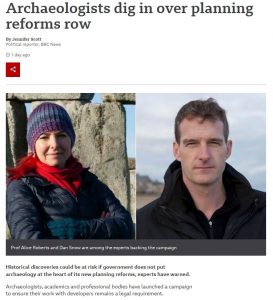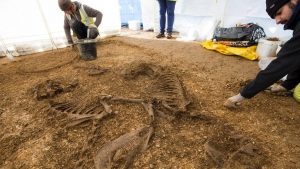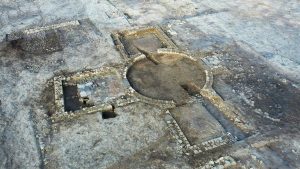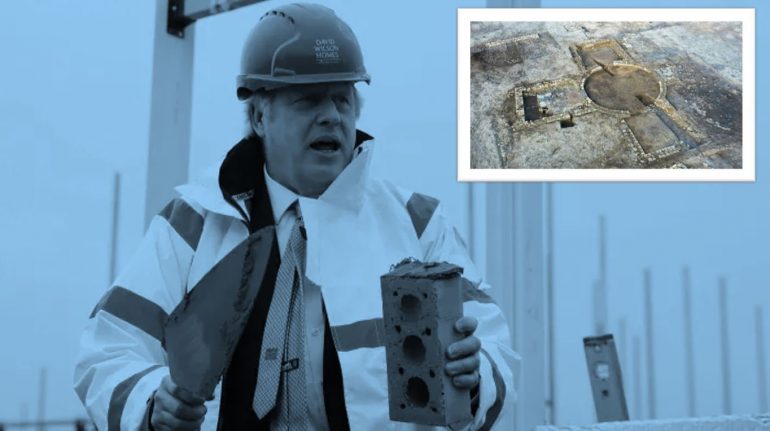By LAMPROU KAOULLAS *
There is a lot of discussion going on in England these days, around the proposals for "liberalization" of the real estate development sector, with archaeologists at the forefront. It is good to watch this discussion in ancient Cyprus as well.
Britain: Urban reform
According to British Prime Minister Boris Johnson, the proposal aims to "transform the arteriosclerotic urban planning system" of England, as he stated in July 2019 when he announced it.
The aim of the changes is to deliver 300,000 new homes each year by 2025. Local authorities have been called upon to review local plans and designate land for either development or protection.
According to the "Financial Times" (18/06/2021), the proposals provoked reactions among the Conservatives. About 50 lawmakers from the ruling party, including Johnson's predecessor Theresa May and former Environment Secretary Theresa Villiers, called the proposals "electorally toxic" and said they were the main reason the Torres lost their seats in Buckingham Zilders, Buckingham. of exceptional beauty. The seat was first transferred to the Liberals and specifically to Sarah Green.
British archaeologists are sounding the alarm about this "Planning Bill", emphasizing that as it stands, it does not incorporate sufficient safety valves, as they existed so far, to ensure that ancient sites are not lost. heirlooms and sites of historical value.
Ancient Cyprus and "developers"
My view is that this debate should be attended by all relevant bodies in Cyprus, an island with a long history, littered with antiquity of all periods, and in which investments in land development (with or without the lure of passports) have peaked in the last 10 to 15 years.
Concerns are often expressed about the environment, the irreparable construction on valuable agricultural land and, of course, the danger that some "developers" are trying to deceive the authorities and the Department of Antiquities regarding the archaeological review of the sites they develop. resulting in disasters of incalculable national value.
On the other hand, the protection and promotion of our historical and cultural heritage, in addition to being a national duty, also contributes to the quality improvement of our tourism product, with clear economic benefits for local communities.
Following is a translation of yesterday's article by Jennifer Scott in "BBC News" (04/07/2021) entitled "Archaeologists dig in over planning reforms row", which gives a picture of the discussion currently taking place in England.

Historical discoveries could be in jeopardy if the British government does not put archeology at the center of new reforms and their design.
This is the warning of British experts who spoke to the BBC.
Archaeologists, academics and other professionals have launched a campaign to ensure that their work remains a legal requirement.
They have the support of academics appearing on television, where Professors Alice Roberts and Dan Snow, as well as a number of MPs and Lords.
The government said it was "determined to protect the archeological treasures".
Prime Minister Boris Johnson first announced his proposals for reforming England's urban planning system last year, with the aim of stopping local adversaries from blocking development in designated development zones.
The "Planning Bill" was ratified in the Queen's speech in May - with the promise of a vote in Parliament next year.
But, according to the BBC, there has already been concern among Conservatives over concerns that it could marginalize locals and lead to uncontrolled growth.
Concerns of archaeologists
Now archaeologists are worried that the current rigorous assessments required by land development professionals - set out in a 1990 law by the then Conservative government - are absent and require assurances that the bill will include them, otherwise the country's heritage could be lost. .

Dr Chloe Duckworth, who co-hosts "The Great British Dig" on More 4, told the BBC that without a specific reference to archeology in the Planning Bill text, "we could see "Some of the less conscientious developers try to save time by avoiding this route - and this can be an omen of utter disaster and loss of archaeological heritage."
He added: "If we do not have these safety valves then we really do not know what we can lose. And that's really the key point. "Until you do excavations and research and see an area at this level of detail, you can not say what archeology is out there."
"Amazing discoveries"
Chloe Duckworth's campaign is backed by Academician Professor Roberts, who presents the BBC's "Digging for Britain".
"I just wrote a book about some important burials all over Britain and in fact quite a few of the examples are things one just would not know if it were not for the archaeologists involved in land development planning. A recent discovery was the amazing burial of a carriage in Poklington - an Iron Age burial ground in Yorkshire - located on the site of a residential development, an amazing discovery. "What it means to integrate archeology into design means that heritage is handled very carefully so that we can shuffle as much as we can before any development happens," he said.

This Roman house was discovered in a residential development area in Scarborough
Historian and television presenter Dan Snow joins his voice in calling on the British government to ensure that the archeological project is secured in land development reforms.
"The program will always be a compromise between the demands of the economy, homeowners, industry, expanding cities, and those of us who want to preserve the past," he said.
"If we eliminate things of exceptional value to create what we believe will be more valuable in the short term, it almost certainly will not be."
He added: "If you look at the destruction of medieval sites in the 19th and 20th centuries, they would now attract billions of pounds in tourism, for example. "It is a terrible mistake to destroy and be disrespectful to your archeology and heritage."
"More attention is needed"
Conservative MP Tim Loughton, who studied Archeology, has already expressed concern about his government's planning reforms and says he has brought the archaeologists' campaign to the attention of ministers.
"Archeology is really important in so many aspects of our lives, there are not just a few weird middle-aged people like me wandering with a trowel in muddy pits," he told the BBC.
"Everything about archeology is to show people their cultural background, it is about the education of our children and where they come from. "He is a big employer who contributes several billion pounds to the UK economy and also contributes significantly to cultural tourism."
He said the new legislation "should take much more account of the cultural and hereditary importance of some of these areas that are now vulnerable to development".
Mr Loughton added: "I will be at the forefront of making sure that there are amendments that improve the law and take into account our culture and heritage before cementing it forever."
Rob Lennox of the Chartered Institute of Archaeologists is working with the British government on legislation and is supporting the archaeologists' campaign.
He said there are good voices from Whitehall to include archeology, but the industry has no guarantee yet.
"The danger is, as we get closer to the need to draft a bill and have broader discussions on the broader format of urban reform, that the archeology between these cracks is lost," he said.
"We just need the message to reach the highest levels of government that archeology is not just a patch on this system, it is not something that slows down the system," he added.
Mr Lennox added: "In essence, this is about preserving our heritage and ensuring that the urban planning system does not inadvertently destroy it as it tries to create the housing and infrastructure we need."
A spokesman for the Department of Communities, Housing & Local Government, which is leading urban planning reforms, told the BBC:
"We know that our archaeological treasures are irreplaceable and we are determined to protect them. "Urban planning reforms will build on the strong safeguards that already exist - we will continue to work with key archaeological institutions as we develop detailed proposals for the Planning Bill."
* Source: Today
